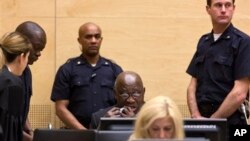PARIS —
Former Ivory Coast President Laurent Gbagbo listened soberly Tuesday afternoon as the International Criminal Court in The Hague conducted a pre-trial hearing to determine whether he should face charges of crimes against humanity.
At issue: Whether the 67-year-old Gbagbo will become the first ex-head of state to stand full trial at the ICC on accusations that he ordered his forces to murder, rape and commit other heinous acts during post-election violence in 2010.
Roughly 3,000 people were killed and hundreds of thousands uprooted following a disputed presidential poll that eventually saw Alassane Ouattara installed as Ivory Coast's new leader.
The former West African leader was shipped off to the ICC after months of detention in northern Ivory Coast. He insists he was resisting a pro-Ouattara rebellion from the north.
Gbagbo occasionally nodded as his defense lawyer Dov Jacobs argued that his client should be tried in Ivory Coast, not in the Netherlands.
"[He] should not face trial at The Hague for a number of reasons, including ... vagueness of the accusations," said Jacobs, adding that tribunal officials should await more details from Ivorian cases against his client's former collaborators, including Gbagbo's wife Simone and youth movement leader Charles Ble Goude.
The ICC issued an arrest warrant against Simone, but so far she has not been extradited from Ivory Coast.
Outside the courtroom, roughly 300 demonstrators called for charges against Gbagbo to be dropped. Inside the court, prosecutors tried to dismantle the defense's arguments one by one.
"The defense alleges a lack of specificity in the charges and it says the main charge is not mentioned in the document apart from the title," said one prosecutor. "That with all due respect … is an inaccurate submission."
Gbagbo is not expected to address the court until later next week. The hearing is scheduled to last until February 28th, and court officials have two months to decide whether to bring the case to trial.
At issue: Whether the 67-year-old Gbagbo will become the first ex-head of state to stand full trial at the ICC on accusations that he ordered his forces to murder, rape and commit other heinous acts during post-election violence in 2010.
Roughly 3,000 people were killed and hundreds of thousands uprooted following a disputed presidential poll that eventually saw Alassane Ouattara installed as Ivory Coast's new leader.
The former West African leader was shipped off to the ICC after months of detention in northern Ivory Coast. He insists he was resisting a pro-Ouattara rebellion from the north.
Gbagbo occasionally nodded as his defense lawyer Dov Jacobs argued that his client should be tried in Ivory Coast, not in the Netherlands.
"[He] should not face trial at The Hague for a number of reasons, including ... vagueness of the accusations," said Jacobs, adding that tribunal officials should await more details from Ivorian cases against his client's former collaborators, including Gbagbo's wife Simone and youth movement leader Charles Ble Goude.
The ICC issued an arrest warrant against Simone, but so far she has not been extradited from Ivory Coast.
Outside the courtroom, roughly 300 demonstrators called for charges against Gbagbo to be dropped. Inside the court, prosecutors tried to dismantle the defense's arguments one by one.
"The defense alleges a lack of specificity in the charges and it says the main charge is not mentioned in the document apart from the title," said one prosecutor. "That with all due respect … is an inaccurate submission."
Gbagbo is not expected to address the court until later next week. The hearing is scheduled to last until February 28th, and court officials have two months to decide whether to bring the case to trial.




